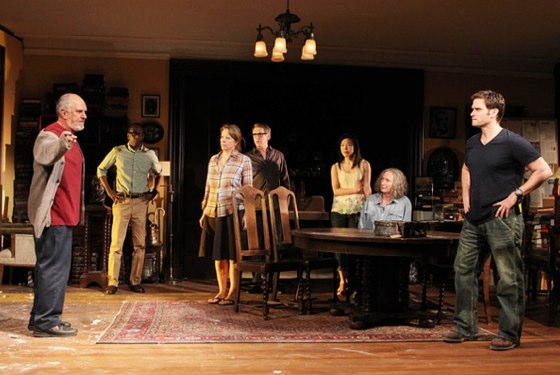In my “Sightings” column for today’s Wall Street Journal, I write in praise of shorter attention spans. Here’s an excerpt.
* * *
Take a look at any TV sitcom of the ’50s and ’60s and compare it to modern-day televised fare. It’s startling to see how slow-moving those old shows were. The same thing is true of live theater. The leisurely expositions of yesteryear, it turns out, aren’t necessary: You can count on contemporary audiences to get the point and see where you’re headed, and they don’t want to wait around for you to catch up with them.
Does this mean that the discursive masterworks of the past are no longer accessible? Yes and no. A great work of art that is organically long, like “The Marriage of Figaro” or “Remembrance of Things Past,” will never lack for audiences. But just as most of Shakespeare’s plays can and should be cut in performance, so should today’s artists always keep in mind that most of us are too busy to watch as they circle the airport, looking for a place to land.
 “The Intelligent Homosexual’s Guide to Capitalism and Socialism With a Key to the Scriptures,” the new Tony Kushner play that opened in New York last week, is three hours and 40 minutes long–a half-hour longer than the Donmar Warehouse production of Shakespeare’s “King Lear” that is currently playing in Brooklyn. Even if “The Intelligent Homosexual’s Guide” were 15% better than “Lear,” Mr. Kushner’s play would still have profited from being stripped of its lengthy digressions and superfluous subplots, most of which serve only to obscure the play’s good parts.
“The Intelligent Homosexual’s Guide to Capitalism and Socialism With a Key to the Scriptures,” the new Tony Kushner play that opened in New York last week, is three hours and 40 minutes long–a half-hour longer than the Donmar Warehouse production of Shakespeare’s “King Lear” that is currently playing in Brooklyn. Even if “The Intelligent Homosexual’s Guide” were 15% better than “Lear,” Mr. Kushner’s play would still have profited from being stripped of its lengthy digressions and superfluous subplots, most of which serve only to obscure the play’s good parts.
Anyone who doubts the virtues of brevity should dip into Oxford University Press’ “Very Short Introduction” series, in which celebrated experts write with extreme concision about their areas of expertise. Each volume in the series is about 140 pages long and runs to roughly 35,000 words of text. (Most serious biographies, by contrast, run to between 150,000 and 200,000 words.)
How much can you say about a big subject in 35,000 words? Plenty, if you’re Harvey C. Mansfield writing about Alexis de Tocqueville or Kenneth Minogue writing about politics. These “Very Short Introductions” are models of their kind, crisp, clear and animated by a strong point of view. They are terse but not anonymous: Both men express themselves not in the blandly corporate tones of an encyclopedia entry but in their own distinctive voices….
* * *
Read the whole thing here.
Archives for 2011
TT: Almanac
“I came to the conclusion many years ago that almost all crime is due to the repressed desire for aesthetic expression.”
Evelyn Waugh, Decline and Fall
TT: See me, hear me
 I’m one of the panelists on this week’s episode of Working in the Theatre, a discussion called “Theatre Journalism: Online and Off” that will be telecast by CUNY-TV on Sunday at five p.m. ET. Joining me are Scott Heller, the theater editor of the New York Times, and stagebloggers Chris Caggiano, David Loehr, and Jan Simpson. The host is Howard Sherman. I really enjoyed taping this program, and I hope the results are as much fun to watch as they were to make.
I’m one of the panelists on this week’s episode of Working in the Theatre, a discussion called “Theatre Journalism: Online and Off” that will be telecast by CUNY-TV on Sunday at five p.m. ET. Joining me are Scott Heller, the theater editor of the New York Times, and stagebloggers Chris Caggiano, David Loehr, and Jan Simpson. The host is Howard Sherman. I really enjoyed taping this program, and I hope the results are as much fun to watch as they were to make.
For more information, or to download a podcast of the show, go here.
Here’s a snippet in which I talk about artblogging and the old media:
TT: So you want to see a show?
Here’s my list of recommended Broadway, off-Broadway, and out-of-town shows, updated weekly. In all cases, I gave these shows favorable reviews (if sometimes qualifiedly so) in The Wall Street Journal when they opened. For more information, click on the title.
BROADWAY:
• Anything Goes (musical, G/PG-13, mildly adult subject matter that will be unintelligible to children, closes Jan. 8, reviewed here)
• Born Yesterday (comedy, G/PG-13, closes July 31, reviewed here)
• The House of Blue Leaves (serious comedy, PG-13, closes July 23, reviewed here)
• How to Succeed in Business Without Really Trying (musical, G/PG-13, perfectly fine for children whose parents aren’t actively prudish, reviewed here)
• The Importance of Being Earnest (high comedy, G, just possible for very smart children, closes July 3, reviewed here)
• Million Dollar Quartet (jukebox musical, G, reviewed here)
• The Motherf**ker with the Hat (serious comedy, R, adult subject matter, extended through July 17, reviewed here)
OFF BROADWAY:
• Avenue Q (musical, R, adult subject matter and one show-stopping scene of puppet-on-puppet sex, reviewed here)
• By the Way, Meet Vera Stark (comedy, PG-13, extended through June 12, reviewed here)
• The Fantasticks (musical, G, suitable for children capable of enjoying a love story, reviewed here)
• Play Dead (theatrical spook show, PG-13, utterly unsuitable for easily frightened children or adults, reviewed here)
CLOSING NEXT WEEK OFF BROADWAY:
• The School for Lies (verse comedy, PG-13, impossible for children, closes May 22, reviewed here)
CLOSING NEXT WEEK ON BROADWAY:
• Lombardi (drama, G/PG-13, a modest amount of adult subject matter, closes May 22, reviewed here)
CLOSING SATURDAY IN LOS ANGELES:
• God of Carnage (serious comedy, PG-13, Los Angeles remounting of Broadway production with original cast, adult subject matter, Broadway run reviewed here)
TT: Just because
A rare kinescope (in two parts) of Peter Pears and Benjamin Britten performing Britten’s Seven Sonnets of Michelangelo on Japanese television in 1956:
TT: Almanac
“There is a natural connection between the teaching profession and a taste for totaliarian government; prolonged association with the immature–fanatical urchins competing for caps and blazers of distinguishing colours–the dangerous pleasure of over-simple exposition, the scars of the endless losing battle for order and uniformity which rages in every classroom, dispose even the most independent minds to shirt-dipping and saluting.”
Evelyn Waugh, “For Schoolboys Only”
TT: Snooky Young, R.I.P.
Trumpeter Snooky Young sings and plays “Tain’t What You Do (It’s the Way That You Do It)” with Doc Severinsen and the Tonight Show Orchestra:
TT: Partial portrait
Today’s Google Doodle is an animated tribute to Martha Graham:
The Washington Post has a posting about Ryan Woodward, the animator, on its “Comic Riffs” blog. The author of the posting quotes from an essay that I wrote about Graham for Time in 1998. If you’d like to read the whole thing–which isn’t quite so laudatory as the quote suggests–go here.
